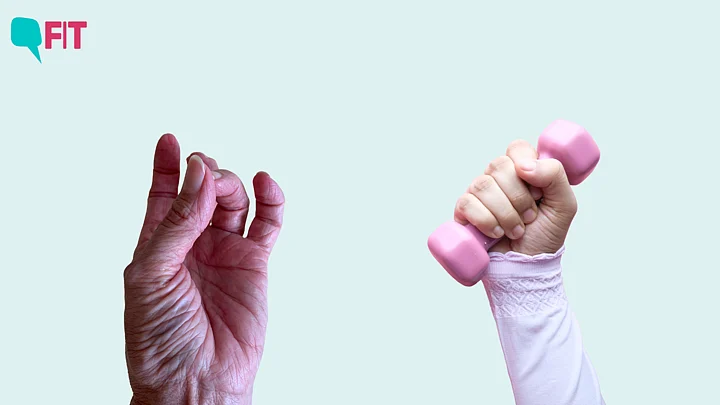If you’ve ever given an interview in your life or tried to make a good first impression on someone, you might have received advice about handshakes. It’s said a firm handshake shows confidence and faith.
But did you know a handshake can be a vital sign to tell if you have diabetes, cardiovascular disease, or other comorbidities?
A new study, titled Hand Grip Strength as a Proposed New Vital Sign of Health: A Narrative Review of Evidences, published in the Journal of Health, Population & Nutrition earlier this month suggests that hand grip strength is a good indicator of the overall health of an individual.
FIT spoke with the study’s authors – Dr Anoop Misra, Chairman, Fortis-C-DOC Centre of Excellence for Diabetes, Metabolic Diseases and Endocrinology, and Dr Raju Vaishya, Senior Consultant, Orthopaedic, Joint Replacement & Arthroscopic Surgery, Apollo Hospital – to help you understand it better.
How is hand grip strength associated with comorbidities?
Dr Misra tells FIT,
“It is directly related to muscle mass and function. The weaker the muscles, the lesser the hand grip strength (HGS). Since weaker muscles mean poor metabolism of the body (muscles are major organs for glucose and lipid metabolism), it causes high blood glucose, cholesterol, and poor state of arteries, impacting cardiovascular health and increasing mortality.”
Dr Vaishya agrees with his co-author. He explains that HGS basically indicates muscle power. If you have muscle weakness, you are prone to have comorbidities and other bone problems like osteoporosis. Mortality is also much higher in people with low hand grip strength.
People who have low hand grip strength might have cardiovascular diseases, diabetes, weak muscle strength, etc.
What are the key takeaways from the study?
Low HSG has been linked with “increased hospitalisation, nutritional status, overall mortality and quality of life.”
Males who have HGS less than 27.5 kg and females who have HGS less than 18 kg have weaker muscles.
The study says that HGS is “lower in Asians, women, less educated and privileged, and those involved in sedentary work.”
Do only old people have poor hand grip strength?
Dr Misra says, “HGS serves as a fundamental metric in assessing muscle function and overall physical capability and is particularly relevant to the ageing population. It holds an important connection to the concept of sarcopenia, which encompasses the age-related decline in muscle mass, strength, and function.”
However, Dr Vaishya adds that Asians, women, and under-privileged people have been found to have poor hand grip strength in studies.
So, what are doctors suggesting?
Make evaluating the hand grip strength a vital test – this is what Dr Vaishya says doctors are advocating for.
He says,
“Temperature, oxygen saturation, blood sugar levels are all vital tests that help you find out if something is wrong in the body. We are advocating that hand grip strength also be made a vital indicator during check-ups.”
Is there something you can do to improve your hand grip strength?
Yes. Dr Misra and Dr Vaishya suggest:
Focus on what you eat and opt for better nutritious choices
Increase your protein and vitamin D intake
Do regular exercises
Practice yoga, walk regularly, and do breathing exercises
Do resistance exercises with weights or therabands
Work on improving your muscular mass and function

